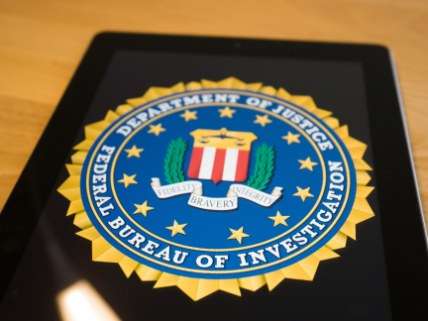You Don't Have to Be a Foreigner to Have Privacy Violated by Trump's 'Extreme Vetting'
Have a friend visiting from another country? DHS wants to know your connections.

Lest we need a reminder that the Donald Trump administration's support for tech privacy seems limited to the members of the Trump administration, take note of how a proposed "extreme vetting" plan from the Department of Homeland Security (DHS) would blow back on U.S. citizens.
A proposal has been referenced before, but a Wall Street Journal story today has DHS officials explaining more specifically that they want to try to force travelers to the United States to disclose the contacts and communications on their phones and provide access to their social media accounts and financial records in order to visit the United States.
This is not a plan just for anybody trying to move here from a war-torn country or a refugee seeking sanctuary for long periods. The administration is considering demanding (or at least reserving the authority to demand) this information from any foreign travelers attempting to come to the United States, even for short visits and even from friendly countries. From the story:
The goal is to "figure out who you are communicating with," the senior DHS official said. "What you can get on the average person's phone can be invaluable."
A second change would ask applicants for their social-media handles and passwords so that officials could see information posted privately in addition to public posts. DHS has experimented with asking for people's handles so they can read public posts, but not those restricted to friends.
This naturally would then also include potentially private communications with and private information about American citizens. A traveler from another country who happens to be a friend of yours could be required to pass along private information about communications with you to the government in order to gain entry.
So at the exact same time that the Trump administration is complaining about the incidental collection of private communications data of his transition team earlier in the year, they're perfectly fine with implementing policies that would lead to dramatic increases in the amount of incidental collection of your personal data.
Meanwhile, there's been a noted increase in attempts by federal officials to gain access to phones and tech devices of even American citizens traveling across the borders, not just foreign visitors. This trend preceded the Trump administration but shows no sign of stopping.
Sen. Ron Wyden (D-Ore.) has previously said he wanted to introduce legislation that would stop the feds from searching the phones of Americans without warrants and to prohibit the government from demanding that Americans provide access to phones in order to regain entry.
Wyden is now introducing that bill, assisted by Sen. Rand Paul (R-Kentucky) in the Senate, and Reps. Jared Polis (D-Colorado) and Blake Farenthold (R-Texas) in the House. From Buzzfeed:
Wyden, Paul, Polis, and Farenthold say that some law enforcement agencies have asserted "broad authority to search or seize digital devices at the border without any level of suspicion" using an exception to the Fourth Amendment that covers border searches. They argue that searching devices — even after obtaining permission to do so — is a "massive invasion of privacy without physical analogs and should be strictly controlled."
The bill would require law enforcement to establish probable cause before searching or seizing a phone belonging to an American. "Manual searches," in which a border agent flips through a person's stored pictures would be covered under the proposed law as well. But the bill does allow for broad emergency exceptions.
"The government should not have the right to access your personal electronic devices without probable cause," Rep. Polis told BuzzFeed news in a statement. "Whether you are at home, walking down the street, or at the border, we must make it perfectly clear that our Fourth Amendment protections extend regardless of location. This bill is overdue, and I am glad we can come together in a bicameral, bipartisan manner to ensure that Customs and Border Patrol agents don't continue to violate essential privacy safeguards."

Show Comments (7)